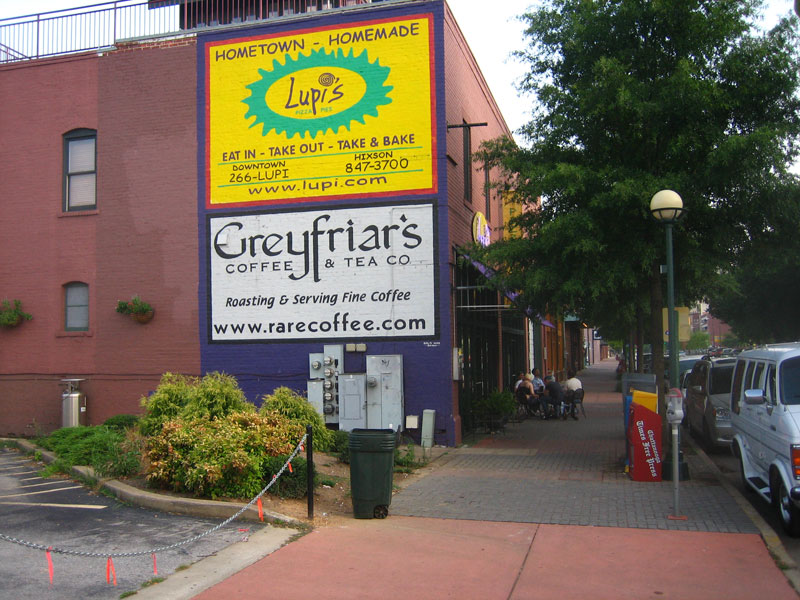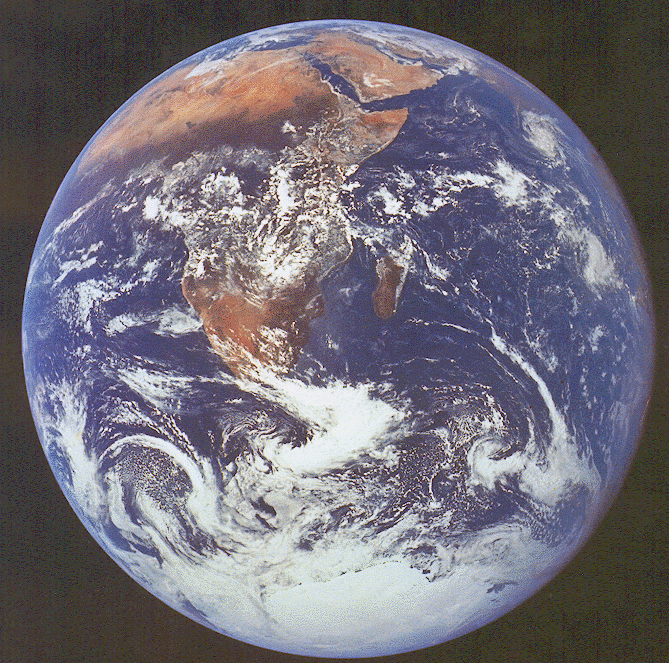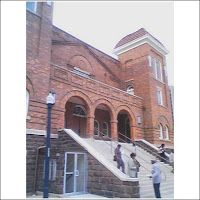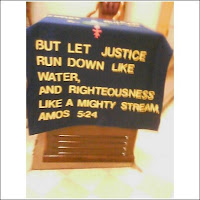As we got ready to leave Birmingham last Sunday, I quickly made a couple of CDs for the road while we were packing the cars, almost randomly picking tracks — mostly I picked artists I wanted to hear. Looking back on yesterday, it appears I picked a pretty good soundtrack.
put the box into a car
drive the car around the world
till you get heard
This was going to be the day: we were driving to Durham, to our house (OK, our rent house), to park in our driveway, and sleep in a room that didn’t require us to check in at the desk. The day played out with a few hitches, the biggest of which was we couldn’t get into the house we were renting until this morning; we were trying to get home, but it seemed to be a moving target. We left Chattanooga late in the afternoon, determined to get to as far as we could and we made it all the way, walking into the lobby of our last hotel (for awhile) at 11:47 pm.
I can hear your voice in the wind
are you calling to me down the long road
do you really think there’s an end
I have lived my whole life down the long road
Our last day in Chattanooga that left us with a couple more stories to tell. After I took Ginger back across the bridge to get some tennis shoes at Fast Break, we decided to find some lunch and cam e upon the Between the Bridges Café, a small lunch-only place with a whimsical flair. We were the only ones in the place since it was almost closing time (they’re only open from 11 to 2:30) and we got to talk to two of the three women who are the co-owners. We learned they were all former teachers (as am I) who wanted out from under the burden of school work to do something they enjoyed and something that allowed them to set boundaries they wanted to live with. One woman described how her school administrator had caused her to decide to leave teaching.
e upon the Between the Bridges Café, a small lunch-only place with a whimsical flair. We were the only ones in the place since it was almost closing time (they’re only open from 11 to 2:30) and we got to talk to two of the three women who are the co-owners. We learned they were all former teachers (as am I) who wanted out from under the burden of school work to do something they enjoyed and something that allowed them to set boundaries they wanted to live with. One woman described how her school administrator had caused her to decide to leave teaching.
“She was crazy,” she told us. “I think on the application it says, ‘Are you crazy?’ and if you answer, ‘Yes,’ they put you in charge.” There was more to the story. “But that crazy lady saved my life.” She went on to tell us of having a mammogram soon after she quit teaching (“I would have put it off until summer.”) and finding breast cancer, even as they were planning to open the restaurant. “I kept trusting God and coming in here. Some days all I could do was sit; other days I felt better and I did what I could.” The small café has gotten some good buzz and the women look like they are having fun chasing their dream together. Sounds like a pretty good deal all the way around.
he’s eight years old with a flour sack cape tied all around his neck
he climbed up on the garage figuring what the heck
he screwed his courage up so tight the whole thing come unwound
got a running start and bless his heart he headed for the ground
he’s one of those who knows that life is just a leap of faith
spread your arms hold your breath and always trust your cape
On the way back to our cars at the hotel I invited Ginger to ride with me on the electric shuttle so she could get a taste of the experience. The driver was the one I met my first night riding and he recognized me, even remembering my hotel. About halfway through the route a short, sturdy woman got on the bus and plopped down beside me. The seat cushion let out the same exhausted wheeze as she did when she dropped into the chair. “How are you doing today?” she asked. I said I was fine and reciprocated with the question. “Oh, I feel turrible,” she said, “just turrible.”
She was dealing with the headaches and stuffiness that come with a sinus infection and was quite animated and descriptive as she told us about it, which she did with both a dramatic and humorous flair. Ginger and I both laughed along with her at one point and she slapped me on the shoulder and said, “Now how about that – I got both of you laughing and I feel turrible. That’s pretty good.”
I’m a stranger here, no one you would know
I’m from somewhere else, well, isn’t everybody though
I don’t know where I’ll be when the sun comes up
until then, sweet dreams, goodnight America
We left this friendly city behind knowing I-24 connects to I-75, which connects to I-40 and that would get us to Durham. We drove out about four o’clock, which let us enjoy part of Chattanooga’s traffic and a good amount of Knoxville’s as well. It also put us winding through the mountains between Knoxville and Asheville on roads we didn’t know in the dark. Tennessee and Carolina don’t simply glide into one another, they crash, leaving a wreck of winding, climbing, diving roads that left me feeling (as I drove in the dark up and down a road I did not know) like the driver in some bizarre version of Space Mountain, going up and down the mountains, all the while navigating the giant trucks, those moving canyons of steel and wheels bearing down all around us, fueled by gasoline, gravity, and capitalism. Somewhere in the middle of it all, we crossed into North Carolina, one step closer to home.
dark and silent late last night
I think I might have heard the highway calling
geese in flight and dogs that bite
signs that might be omens say I’m going , going
I’m gone to Carolina in my mind
As we got out of the mountains and most of the trucks, the songs came round again and I smiled and cried as the words filled the spaces in the car not occupied by boxes and bags. About sixty miles out, Durham started showing up on the mileage signs and we both began to realize our journey was almost through.
there’s a highway rising in my dreams
deep in the heart I know it gleams
for I have seen it stretching wide
clear across to the other side
Just before midnight, we pulled into the parking lot of the Holiday Inn Express where we stayed not long ago when we were traveling with the pups. A gracious and welcoming Indian woman checked us in and said with some surprise, “You’ve stayed with us before,” as though we somehow belonged. By the time we got to our room, it was Thursday – today – the day we will get to move in to our house, the day Ginger will go to her office for the first time as the pastor, the day we start living here. I queued the last song up on purpose:
dust in our eyes our own boots kicked up
heartsick we nursed along the way we picked up
you may not see it when it’s sticking to your skin
but we’re better off for all that we let inand I don’t know where it all begins
and I don’t know where it all will end
better off for all that we let in . . .
The driving is done; the journey continues . . .
Peace,
Milton
P. S. — I couldn’t help but add this little early nineties video treat.


















